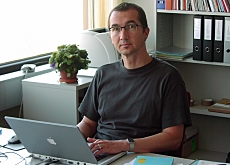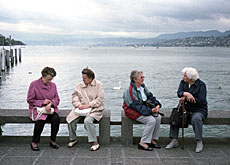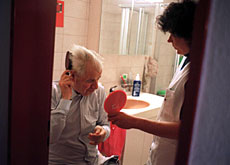Spanish sun lures Swiss pensioners

Older Swiss are increasingly looking abroad for a place to retire. Social geographer Andreas Huber tells swissinfo why Spain's Costa Blanca is so popular.
The coastal area has a similar appeal to Switzerland’s southern Ticino region. But it also has some drawbacks: an unrelenting construction boom, rubbish mountains and water shortages.
As part of a research project, Huber spent 15 months interviewing Swiss expatriates on the Costa Blanca, the 200km of coastline on the eastern Spanish coast which includes the major tourist destinations of Benidorm and Alicante.
Asking the pensioners about their reasons for moving, their concerns and problems, Huber discovered that not all their experiences were positive.
swissinfo: What do Swiss expatriates find so appealing about the Costa Blanca?
Andreas Huber: A special infrastructure has developed there over the past two decades: you can find German newspapers and German doctors and old people’s homes. The climate is very important for some people. And the prices too – many things are still cheaper in Spain than in Switzerland.
swissinfo: What type of person heads off to Spain to retire?
A.H.: People come from all social classes, but mainly from the middle class, as you need a certain financial buffer to make the move. Many of them have lived abroad during their careers.
swissinfo: What is life on the Costa Blanca like for them?
A.H.: Many live in urban developments. These aren’t settlements that have developed over time, but rather purpose-built housing zones with very few public areas. There’s usually just a main street with all the shops, banks, petrol stations and car hire firms.
There aren’t any reference points to help you get your bearings, such as churches and schools.
swissinfo: Yet many claim to be happy there.
A.H.: A lot of them go, saying to themselves: “I’m going to move somewhere that is paradise for me”. They then hear a chorus of negative comments from friends or acquaintances, saying “I could never live there!” or “What on earth do you do all day?”
They then have to convince themselves that it has been a positive step. They have to believe in this paradise otherwise it would get difficult.
You end up with the absurd notion that life is going well just because you are somewhere with good weather and a big house. First of all, whenever you go abroad you take your history and problems with you; secondly, happiness does not depend on these material things.
swissinfo: Have some people’s dreams been shattered?
A.H.: Many criticise the constant building work, and the noise associated with that, and end up looking around for somewhere else.
Some admit to being lonely, but they look at it pragmatically: they say they would also be lonely in Switzerland.
swissinfo: Health becomes increasingly important as one gets older – what does the Costa Blanca offer in that respect?
A.H.: This is a potentially huge problem. Although the medical and nursing services on offer are constantly expanding, there’s a relatively big shortage of beds in old people’s homes and care homes – not least because fewer and fewer Spanish pensioners are being looked after by their children.
It is possible to get homecare help, but this is offered privately and comes at a price. And this leads to another problem: pensioners make up around a third of some communities.
Ill health and the death of a partner are the main reasons for returning to Switzerland.
swissinfo: You describe the Costa Blanca as a “microcosm of Europe”. In what way?
A.H.: People of many nationalities live together, or side by side, in a relatively small area.
swissinfo: So are the Swiss residents pretty well integrated?
A.H.: As a rule they are very well integrated, although not necessarily in Spanish society. It is more a case that they are well integrated in their own “national communities”, through clubs, networks, and places where they can get help when problems arise.
Modern communications help them stay in touch with relatives and friends in Switzerland, and satellite television also helps.
swissinfo: Has this turned the Costa Blanca into the new Ticino?
A.H.: Absolutely. People with money tend to settle in Ticino. So you could say the Costa Blanca is the poor man’s Ticino.
swissinfo-interview: Renat Künzi
In 2004, 21,500 Swiss were registered as living in Spain, with 7,500 in Madrid and 4,800 on the Costa Blanca.
But the real number is much higher as many are not registered with the authorities.
The trend towards retiring to the Costa Blanca dates back to the late 70s when Spanish companies advertised retirement homes in Switzerland.

In compliance with the JTI standards
More: SWI swissinfo.ch certified by the Journalism Trust Initiative


You can find an overview of ongoing debates with our journalists here . Please join us!
If you want to start a conversation about a topic raised in this article or want to report factual errors, email us at english@swissinfo.ch.